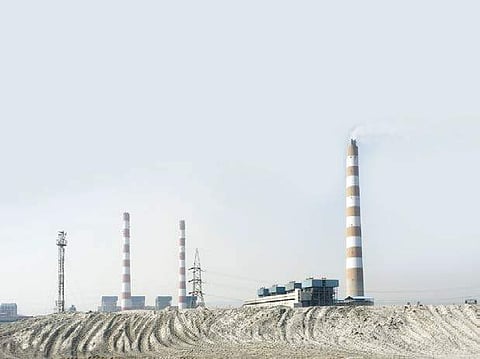

KORBA (CHHATTISGARH): Fly ash—a by-product of coal-fired power plants—being dumped by the power houses has made the life of people in the power capital of Chhattisgarh, Korba, miserable. Locals say the fly-ash dyke near power giant National Thermal Power Corporation close to Dhanras is to be blamed for increasing cases of health problems in the area.
International Monetary Fund (IMF) Managing Director Christine Lagarde had recently cited that pollution from coal-generated plants in India causes 70,000 premature deaths every year.
Korba that is home to 14 thermal power plants with a capacity of 8,625 megawatt accounts for 17.26 per cent of the total coal produced in the country.
So, can there be more health worries over pollution in Korba? “Enormously”, the Korba medical fraternity asserts. Physician Dr S K Agrawal cautioned that respiratory problems, skin and eye allergies, and ailments of kidney and digestive system are on the rise as compared to other districts. Dr Ajay Shesh, a senior pathologist, quoting from his records said that the nature of pollutants owing to fly ash has changed over the years resulting to emergence of serious ailments.
However, not a single study on the impact on health has been conducted in Korba. “We have not documented the impact of environment pollution on health here. But that will be done in future,” said Director (health) R Prasanna.
Similar is the plight of residents of Risda Basti and Bhadrapara, located 300 metres from the ash embankment of Chhattisgarh State Electricity Board. Their repeated complaints have not borne any fruit. “Persisting fly ash problem aggravates in summer. Though monsoon brings some relief, there is no safeguard mechanism in place,” said Ganesh Ram Yadav, a small businessman.
It has even affected the agricultural practices here. Ram Kumar of Rukhari village, who owns 100-acre farmland, said, “The productivity has substantially reduced. According to a report, the thermal power plants in Korba generate 2.7 crore tonne of ash annually.
Regional officer of Chhattisgarh Environment Conservation Board in Korba, R D Shinde admits that ash disposal is a serious issue. “All thermal power companies need to utilise the ash which they dispose of. Power plants are not complying with Union Ministry of Environment and Forest’s amendment notification in 2009, which makes utilisation of 100 per cent ash compulsory,” Shinde said.
Meanwhile, environmental activist Laxmi Chouhan said, “Barely 20 per cent of the ash is being used for cement production and in other building materials and the remaining is stashed at ash dykes. The only recourse remaining is to fill available open cast and underground mines with ash.”
Korba was declared as fifth critically-polluted area in 2010 by the Central Pollution Control Board, following which the state devised Korba Action Plan. Chemistry professor Dr Shams Parvez, in his research, has confirmed presence of environmental toxins in huge amount in fly ash at Korba.